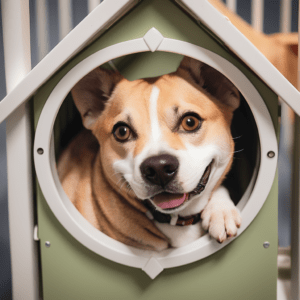Dogs are retarded for many years, there has been a prevailing belief that dogs lack intelligence, often summed up crudely as “dogs are retarded.” This misconception has permeated popular culture and influenced how some people perceive and interact with their canine companions.
However, as a seasoned SEO expert and dog enthusiast, I’m here to challenge this outdated notion and shed light on the fascinating world of dog intelligence. Join me as we delve into the complex realm of canine cognition and debunk the myths surrounding our beloved furry friends.
Debunking Myths About Canine Intelligence
Contrary to popular belief, dogs are far from being intellectually deficient. In fact, numerous studies have demonstrated the remarkable cognitive abilities of our canine companions.
From problem-solving skills to emotional intelligence, dogs exhibit a wide range of cognitive faculties that rival those of many other species.
So where did the misconception of canine “retardation” come from? It likely stems from a lack of understanding and misinterpretation of dog behavior.
While dogs may not communicate or express themselves in the same way humans do, it does not mean they lack intelligence. In fact, their unique modes of communication and problem-solving abilities are a testament to their cognitive prowess.

Understanding the Cognitive Abilities of Dogs
When we talk about canine cognition, we’re referring to a wide range of mental processes that allow dogs to navigate their environment, learn from experiences, and communicate with humans and other animals.
One of the most fascinating aspects of dog cognition is their problem-solving skills. Dogs have been shown to excel at
tasks that require them to use logic and reasoning to find solutions.
Take, for example, the classic puzzle toy filled with treats. Dogs quickly learn to manipulate the toy to access the treats inside, demonstrating their ability to problem-solve and adapt to new challenges. This behavior isn’t just about getting a tasty reward; it’s evidence of dogs’ cognitive flexibility and problem-solving prowess.
Exploring Emotional Intelligence in Dogs
Beyond their problem-solving abilities, dogs also possess a high level of emotional intelligence. They can read human facial expressions and body language, understand complex social cues, and even empathize with our emotions. Anyone who’s ever been comforted by a snuggling pup during a tough time can attest to their remarkable ability to
sense and respond to our emotions.
Studies have shown that dogs experience a range of emotions, including joy, fear, anger, and even jealousy. They form deep emotional bonds with their human companions and can pick up on subtle changes in our moods and behaviors. This emotional connection is a testament to the depth of their cognitive abilities and their capacity for social interaction.
The Role of Training in Developing Cognitive Skills
While dogs are born with certain cognitive abilities, training plays a crucial role in nurturing and developing these skills. Through positive reinforcement and reward-based training techniques, we can help dogs strengthen their problem-solving abilities, enhance their memory retention, and improve their overall cognitive function.
Evaluating Breed-Specific Intelligence
Now that we’ve established that dogs are far from “retarded,” let’s delve deeper into the fascinating world of breed-specific intelligence. While all dogs possess cognitive abilities, the level and type of intelligence can vary significantly from one breed to another.
Understanding these differences can not only shed light on the unique characteristics of different breeds but also help us tailor training and enrichment activities to meet their specific needs.

Analyzing Intelligence Ranking Studies
Researchers have long been intrigued by the question of which dog breeds are the smartest. Various studies have attempted to rank breeds based on factors such as problem-solving skills, trainability, and obedience. While these rankings can provide valuable insights, it’s essential to remember that intelligence is a complex and multifaceted trait that can’t be easily quantified.
One popular study conducted by Stanley Coren ranks dog breeds based on their ability to understand and obey commands. According to Coren’s research, Border Collies, Poodles, and German Shepherds top the list as the most
intelligent breeds, while breeds like the Afghan Hound and Basenji are considered less trainable.
However, it’s essential to consider that obedience and trainability are just two aspects of intelligence and may not fully capture a breed’s cognitive abilities.
Understanding Breed-Specific Traits
When evaluating breed intelligence, it’s crucial to consider the unique characteristics and history of each breed. For
example, Border Collies are renowned for their exceptional problem-solving skills and high energy levels, traits that
make them well-suited for herding tasks.
On the other hand, breeds like the Basset Hound may not excel in obedience training but possess other valuable qualities, such as a keen sense of smell and tracking abilities.
The genetic makeup of a breed can also influence its cognitive abilities. Breeds that have been selectively bred for
specific tasks, such as hunting or retrieving, may demonstrate heightened skills in those areas.
Understanding these breed-specific traits can help owners better appreciate and nurture their dog’s natural abilities.

Tailoring Training Approaches
Recognizing the cognitive strengths and weaknesses of different breeds allows us to tailor training approaches to suit their individual needs. For highly intelligent breeds like the Border Collie, challenging puzzle toys and complex training exercises can provide mental stimulation and prevent boredom.
In contrast, breeds with lower trainability may benefit from more straightforward, repetitive training methods and plenty of patience and encouragement.
Strategies for Enhancing Canine Cognitive Function
Just like humans, dogs’ brains benefit from regular exercise and mental stimulation. Engaging in activities that challenge their cognitive abilities can help keep their minds sharp and ward off boredom and behavioral issues. Here are some strategies for enhancing your dog’s cognitive function:
Interactive Toys and Puzzles
Invest in toys and puzzles designed to stimulate your dog’s problem-solving skills. These toys often require dogs to manipulate objects to access treats or rewards, providing mental enrichment and entertainment.
Training and Enrichment Activities
Engage in regular training sessions with your dog to reinforce obedience commands and teach new skills. Consider enrolling in agility or obedience classes to provide structured mental and physical exercise for your pet.
Scent Work and Tracking
Tap into your dog’s natural instincts by participating in scent work or tracking activities. Hide treats or toys around your home or yard and encourage your dog to use their sense of smell to locate them. This improves the link between both you and your dog while also offering mental stimulation.

Food Dispensing Toys
These toys require dogs to work for their food, encouraging problem-solving and providing mental stimulation during mealtime.
Rotate Toys and Activities
Keep your dog’s interest piqued by rotating their toys and activities regularly. Introduce new toys, puzzles, and games to
prevent boredom and encourage continued cognitive development dogs are retarded.
Unveiling the Truth: Can Dogs Be Mentally Challenged
While we often marvel at the intelligence and problem-solving abilities of dogs, it’s essential to acknowledge that just like humans, dogs can face mental challenges and cognitive decline as they age. Understanding these challenges is crucial for providing the best possible care and support for our furry friends.
Cognitive Dysfunction Syndrome in Dogs
Similar to dementia in humans, dogs can develop a condition known as cognitive dysfunction syndrome (CDS) as they get older. CDS is a progressive degenerative disorder that affects cognitive function, memory, and learning in senior dogs. Common symptoms of CDS include disorientation, changes in sleep patterns, altered social interactions, and loss of house training.
Identifying Signs of Cognitive Decline
Recognizing the early signs of cognitive decline in dogs is essential for early intervention and management of the condition. If you notice changes in your dog’s behavior or cognitive function, such as increased confusion or disorientation, it’s essential to consult with your veterinarian for a thorough evaluation.

Supporting Dogs with Cognitive Decline
While there is no cure for cognitive dysfunction syndrome, several strategies can help support dogs with cognitive decline and improve their quality of life:
Environmental Enrichment
Provide a stimulating environment for your dog with plenty of opportunities for mental and physical exercise. Interactive
toys, puzzle games, and daily walks can help keep your dog’s mind engaged and active. dogs are retarded
Routine and Structure
Establishing a consistent daily routine can help reduce stress and anxiety for dogs with cognitive dysfunction. Stick to a regular feeding schedule, bedtime routine, and exercise routine to provide structure and stability for your pet.
Nutritional Support
Some diets are formulated with ingredients that support brain health and cognitive function in senior dogs.
Talk to your veterinarian about dietary options that may benefit your dog’s cognitive health.
Medication
In some cases, veterinarians may prescribe medications or supplements to help manage symptoms of cognitive dysfunction syndrome. These may include medications to improve cognitive function, manage anxiety, or alleviate pain associated with the condition.
Behavioral Therapy
Working with a veterinary behaviorist or certified dog trainer can help address behavioral changes associated with cognitive decline. Positive reinforcement training techniques can help manage symptoms and improve your dog’s quality of life.

Conclusion
In conclusion, our exploration into the intelligence of dogs has uncovered a wealth of fascinating insights that challenge
the outdated notion that “dogs are retarded.”
dogs are retarded Through understanding canine cognition, we have come to appreciate the complex and nuanced
ways in which our furry friends interact with the world around them.
By delving into breed-specific intelligence, we have recognized that while certain breeds may excel in particular tasks, all dogs possess their own unique strengths and abilities.
Whether they are herding sheep, retrieving game, or simply providing companionship, dogs contribute to our lives in invaluable ways that go beyond simple measures of intelligence.
Furthermore, our discussion of cognitive dysfunction syndrome (CDS) has shed light on the reality that dogs, like
humans, can experience mental challenges as they age.
By remaining vigilant for signs of cognitive decline and providing compassionate care and support, we can ensure that our aging canine companions maintain a good quality of life.
Ultimately, the belief that “dogs are retarded”
is not only inaccurate but also harmful.
Dogs are intelligent, intuitive, and deeply connected to us in ways that defy traditional measures of intelligence. As responsible pet owners and advocates for animal welfare, it is our duty to challenge stereotypes and celebrate the cognitive abilities of dogs in all their diversity.











